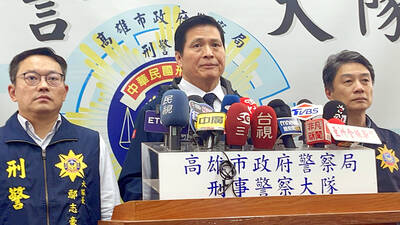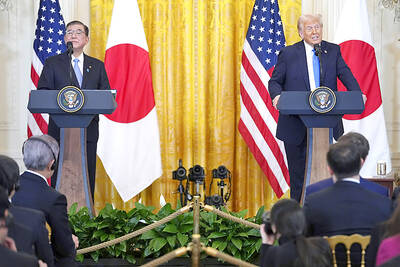Tamkang University in Tamsui (淡水), Taipei County, yesterday became the first university in the world to be granted “international safe school” status — a designation aimed at enhancing safety awareness and education — by a WHO-affiliated organization.
Max Vosskuhler, chairman of the International Safe Schools Committee, said at a designation ceremony in Taipei yesterday that Tamkang was the world’s first university to have “put the package of safety and health together.”
The International Safe Schools Designation Program is a project of the Peaceful Resources Center, an Affiliate Safe Community Support Center for the WHO’s Collaborating Center on Community Safety Promotion.
“This university has led the way in becoming the first international safe school with a persistent commitment to its students, faculty and everybody in their community to promote safety,” he said.
Vosskuhler said the university had met all seven requirements during the committee’s evaluation, including having a school committee responsible for making decisions for safety at the school, implementing safety policies for all groups at the university and a commitment to sharing the school’s experience with local, national and international schools.
“Signing the agreement [between the university and the committee] does not mean that a school is 100 percent safe,” he said. “[The recognition] signifies commitment of the organization to become safer.”
Figures provided by the university show some 50 schools worldwide have won international safe school status or are being reviewed by the International Safe Schools Committee.
Lee Ming-hsien (李明憲), a professor at National Dong Hwa University who plays a key role in the Taiwan International Safe Schools Promotion Center, said Vosskuhler and other International Safe Schools Committee members would over the next few days inspect Taiwanese primary and junior high schools that had applied for the designation.

Johanne Liou (劉喬安), a Taiwanese woman who shot to unwanted fame during the Sunflower movement protests in 2014, was arrested in Boston last month amid US President Donald Trump’s crackdown on illegal immigrants, the Criminal Investigation Bureau (CIB) said yesterday. The arrest of Liou was first made public on the official Web site of US Immigration and Customs Enforcement (ICE) on Tuesday. ICE said Liou was apprehended for overstaying her visa. The Boston Field Office’s Enforcement and Removal Operations (ERO) had arrested Liou, a “fugitive, criminal alien wanted for embezzlement, fraud and drug crimes in Taiwan,” ICE said. Liou was taken into custody

ON PAROLE: The 73-year-old suspect has a criminal record of rape committed when he was serving in the military, as well as robbery and theft, police said The Kaohsiung District Court yesterday approved the detention of a 73-year-old man for allegedly murdering three women. The suspect, surnamed Chang (張), was arrested on Wednesday evening in connection with the death of a 71-year-old woman surnamed Chao (趙). The Kaohsiung City Police Department yesterday also unveiled the identities of two other possible victims in the serial killing case, a 75-year-old woman surnamed Huang (黃), the suspect’s sister-in-law, and a 75-year-old woman surnamed Chang (張), who is not related to the suspect. The case came to light when Chao disappeared after taking the suspect back to his residence on Sunday. Police, upon reviewing CCTV

TAIWAN ADVOCATES: The resolution, which called for the recognition of Taiwan as a country and normalized relations, was supported by 22 Republican representatives Two US representatives on Thursday reintroduced a resolution calling for the US to end its “one China” policy, resume formal diplomatic ties with Taiwan and negotiate a bilateral Taiwan-US free trade agreement. Republican US representatives Tom Tiffany of Wisconsin’s 7th Congressional District and Scott Perry of Pennsylvania’s 10th District were backed by 22 Republican members of the US House of Representatives. The two congressmen first introduced the resolution together in 2021. The resolution called on US President Donald Trump to “abandon the antiquated ‘one China’ policy in favor of a policy that recognizes the objective reality that Taiwan is an independent country, not

The US-Japan joint statement released on Friday not mentioning the “one China” policy might be a sign that US President Donald Trump intends to decouple US-China relations from Taiwan, a Taiwanese academic said. Following Trump’s meeting with Japanese Prime Minister Shigeru Ishiba on Friday, the US and Japan issued a joint statement where they reaffirmed the importance of peace and stability in the Taiwan Strait and support for Taiwan’s meaningful participation in international organizations. Trump has not personally brought up the “one China” policy in more than a year, National Taiwan University Department of Political Science Associate Professor Chen Shih-min (陳世民)